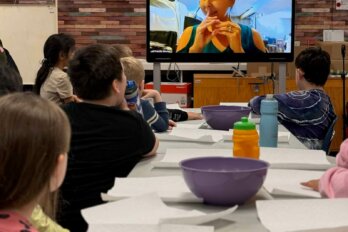If there’s one thing Cormier knows, it’s that he doesn’t have all the answers. That’s why the President and CEO of Desjardins spends so much of his time listening. But it’s who he listens to that makes him unique among business leaders: he listens to young people and pays special heed to the social issues that matter to them. And then he takes action.
“You can’t be on the sidelines, looking at the game without being on the ice right now,” he says. “With the pandemic, we have a moment right now where we can press the reset button for a more inclusive, diversified economy and society for not only the next few years, but the next quarter century. We must work together.”
Cormier believes Desjardins can be part of the solution—and he’s not just talking the talk. Under his leadership, Desjardins has committed to climate change action by keeping operations carbon neutral, focusing infrastructure investments on renewable energy, reducing the carbon footprint of investments and setting a net zero emissions target. The company has also undertaken equity, diversity and inclusion initiatives, as evidenced by its commitments to the BlackNorth Initiative, participation on the Canadian Board Diversity Council (CBDC) and launch of the Empowering Women network.
“We, as business leaders, need to open our minds and listen to what they have to say. And not just listen—we have to give them more leeway to really influence us.”
The S in ESG
He’s also a firm believer in the value of ESG (environmental, social and governance critiera). These standards are increasingly used by socially conscious investors to screen investments, and Cormier considers these values intrinsic to Desjardins’s co-operative model.
SETTING
THE STAGE
FOR SUCCESS
The business community can help young entrepreneurs achieve their goals. Guy Cormier explains how.

Listen.
Arranging to regularly meet with young people connected to your industry — whether they’re consumers, participants, or young leaders themselves—can connect you to the lived reality of this generation, as well as their expectations. “It’s so important to really listen and be open-minded when we receive this feedback,” Cormier says.

Take action.
It’s one thing to listen, but when business leaders then go on to throw barriers up before in order to avoid moving forward with suggestions, Cormier becomes frustrated. “We’ll never be perfect,” he says. “There’s no overnight solution to these complex problems, so we have to have a step-by-step approach and try to be better.”

Be committed.
Walking the walk means setting targets and actually trying to achieve them. “The younger generation—they’re so clever, so fast, so quick,” Cormier says, laughing. “They know within 30 seconds if you’re faking it.” They want to see companies and leaders that are really committed. Even if you don’t solve every problem it’s absolutely necessary to, at the very least, do what you set out to achieve and try to be better with every commitment you make.
Desjardins was launched in 1900 by Alphonse Desjardins in response to a specific social injustice: French Canadians in Quebec were not allowed access to credit, or even to open their own bank accounts at the time. Finding solutions to social issues and long-term thinking is baked into the foundation of the co-operative model. Desjardins, across its business lines and across the country, remains true to its founding ideals of social justice, equity and sustainability.
“I’m always pleased to say that Alphonse Desjardins was a social entrepreneur 120 years ago, because that’s what he was,” Cormier says. “At that time it wasn’t called ESG criteria. But the “S” in ESG was always really important.”
He doesn’t want his employees or the board to look at the results for the next quarter—he wants them to look at the results for the next quarter century. And the integration of ESG criteria does exactly that: it creates a focus on the future and on sustainable decisions.
It’s in their DNA
Cormier feels that the circular economy—what the federal government defines as a “way of doing business that retains and recovers as much value as possible from resources by reusing, repairing, refurbishing, remanufacturing, repurposing or recycling products and materials”—underpins how many young entrepreneurs do business. ESG isn’t just a checklist; it’s built into their DNA. Before they’ve launched their first product or service, they’re already thinking about their company’s social impact and how they can support other local businesses.
“These are the people who, in 40 years, will be managing our companies and will be our politicians,” he says. “If we want to build a world that is better and stronger and more resilient, we must listen to what they want to say right now.”
Cormier has prioritized young voices throughout his career at Desjardins, establishing a Youth Advisory Board when he was elected in 2016. The board is made up of 12 people aged 18 to 35 (four Desjardins employees, four cooperative members and four members from the Desjardins Young Intern Director program), each of whom serves a two-year term. During that time, they have access to the Desjardins board of directors and board of management and meet with Cormier four to six times a year to share what’s on their minds. Most importantly, they participate in the
decision-making process for all of the financial co-operative’s projects.
“They’ve influenced so many of the decisions we made,” Cormier says. “The people we already have in the room are great, but they were looking at problems through their own lenses; having someone from 18 to 35 in the room who is looking towards their own future helped influence decisions about climate change, technology, digital transformation, diversity and more. We, as business leaders, need to open our minds and listen to what the younger generation has to say. And not just listen—we have to give them more leeway to really influence us.”
Change is coming, and Desjardins is listening to young voices to be part of that change. It’s not a one-size-fits-all approach and it’s not something that will be accomplished in one weekend—it’s a step-by-step approach, according to Cormier. “I really feel that right now we are, as a society, looking at this roadmap for the next decade or the next quarter century, to see how we can build something that is more equitable for everyone.”





